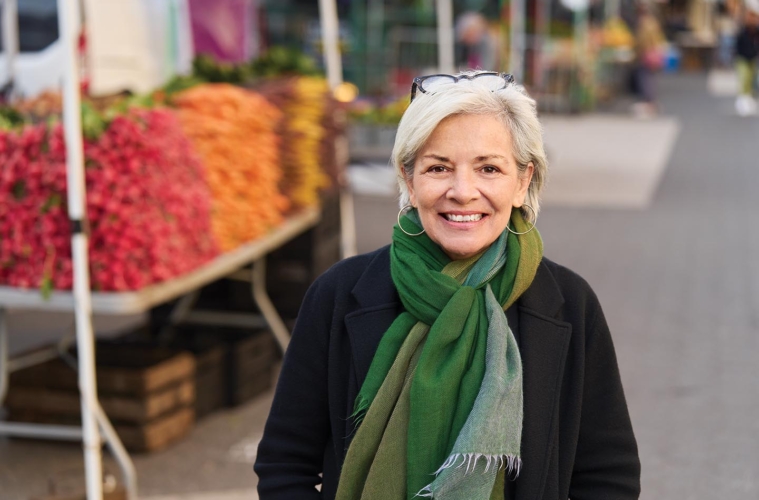As she departed New York City for Washington, D.C., to attend the White House Conference for Hunger, Nutrition, and Health last fall, Annette Nielsen ’82 was thinking of her former employer Daniel Patrick Moynihan. Her location — the sleek, recently renovated Moynihan Train Hall — was one reason, but also, she was remembering how the now-deceased politician attended the first (and only other) conference on the subject in 1969.
“If there’s a topic you’re passionate about, it’s going to take 30 years to get the needle to move or to see any kind of action that’s meaningful,” Nielsen remembers Moynihan saying.
It’s now been more than 50 years since that first conference and 30 years since Nielsen worked for Moynihan, who made headlines for working on health care reform. She has dedicated her career to that same goal by educating others about healthy eating as well as the vital role farms play in our nutrition and food systems. Most recently, Nielsen has been appointed team lead for the New York State Department of Agriculture and Markets.
Nielsen, who is in the marketing division of the department, sits on a team currently tasked with two areas: making recommendations for better processes to transport food throughout the state (“to the people who need it, the markets that need it, and helping the farmers move the food in the most efficient way”) as well as increasing the number of community gardens by improving land access and skill development. Her department also made recommendations for the 2023 Farm Bill.
Nielsen’s career has circled back to government after several decades as a journalist. The Colgate fine arts major started out as an administrator for several politicians, including Sen. Ted Kennedy, before a shift in political power replaced Moynihan and forced Nielsen to consider a new direction.
She decided to become a writer, earning her MA from Johns Hopkins. In choosing a focus, Nielsen returned to a knowledge base that’s been part of her since childhood. She’d grown up in the Adirondacks, where her father was a forester who hunted and fished for food while her mother was a home economics teacher. Through her mother, Nielsen learned that a meal should include a variety of colors and textures. “She would always talk about the vitamins and minerals on each part of our plate.”
The first article Nielsen pitched, to the Hill Rag in D.C., was about a chef doing demos at the farmer’s market. Nielsen soon became the newspaper’s food writer, and when she and her husband moved to upstate New York, Nielsen assumed that position at the Saratogian in Saratoga Springs. “A lot of people were starting to write about chefs at that point, [but] I started looking at the farmer as the rock star,” she recalls. “There were so many farmers and farms and such wonderful stories behind them.”
In addition her journalism, Nielsen made other efforts related to food. As a member of her town’s board of education, she took students on field trips to local farms. She helped turn the community center’s kitchen into a place where farmers and producers could work. She even helped deliver lambs and made cheese at a friend’s sheep farm. These experiences were “a second schooling,” Nielsen says, “learning about what it takes to run a farm … learning about our food system up close and personal.”
Although she now lives in New York City, Nielsen hasn’t lost her perspective on the importance of farmers. Returning from the White House conference, she’s thinking about the ways in which they can help with the event’s stated ambitions, such as ending food insecurity. (President Joe Biden unveiled a plan to end hunger in the U.S. by 2030.)
“If we look at our food system, I think the food is there,” she says. “It’s how we get it from place to place and make sure people have enough money to afford that food.”
Reflecting on the first White House conference in 1969, she says, “We’ve made progress,” citing evolved dietary guidelines and services like SNAP (the Supplemental Nutrition Assistance Program).
“Our country has an ability to have an impact on so many lives, with programs that can make a difference now and in the future.” Nielsen is hopeful that, one day, we’ll look back on this recent conference and say, “This [gave us] some solid action items and programs that [had] an impact across the board, on everyone’s health and well-being.”
Update: Nielsen has taken a new position and is now executive director of The Hunter College New York City Food Policy Center.

